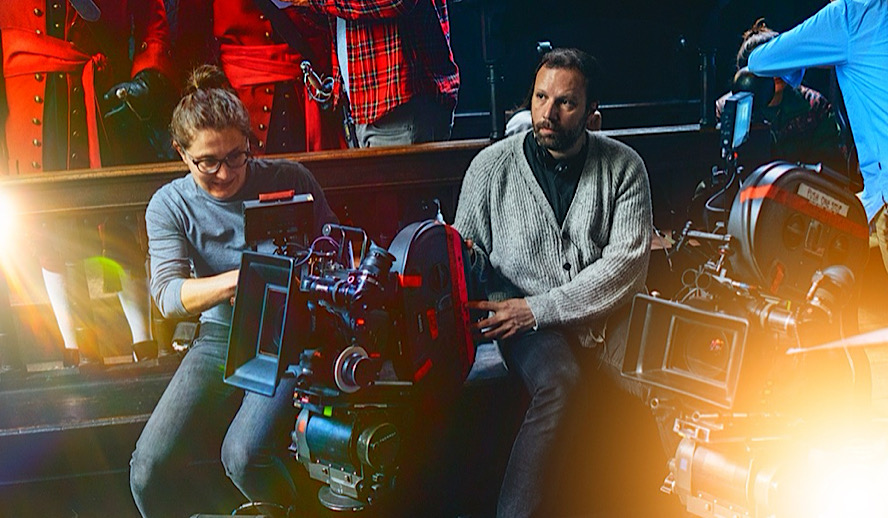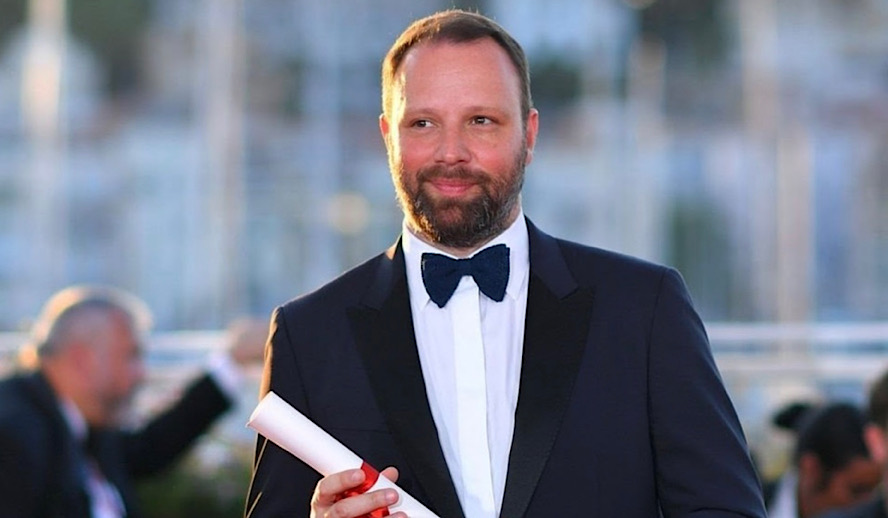Table of Contents

Video Version of this Article
Photo/Video: Yorgos Lanthimos/Atsushi Nishijima/Hollywood Insider YouTube Channel
Although Yorgos Lanthimos is yet to be a household name in film, the Greek director’s recognition is no longer confined to art-house circles. Since he moved to London and started to develop his projects in English, with significantly bigger budgets and internationally recognized faces like Colin Farrell, Rachel Weisz and Olivia Colman, he has garnered a considerable reputation for his black humor, exaggerated premises, “quirky” characters and reflections on dynamics of power. He also received critical acclaim for this work: The Lobster won the Jury Prize at 2015 Cannes Film Festival, followed by the Best Screenplay prize for Killing of A Sacred Deer in 2017. Lastly, The Favourite was nominated for 10 Academy Awards including Best Picture and won the Grand Jury Prize at the 2018 Venice International Film Festival. I must point out that The Favourite’s Olivia Colman also won the Academy Award for Best Actress.
And yet, perhaps besides Dogtooth, Lanthimos’ earlier work is much less known and accessible. Moreover, there seems to be a considerable number of viewers who see his style of filmmaking – full of absurdism, deadpan and physicality – as scattered, misguided and boring at best, and empty, nihilistic and pretentious at worst. In opposition to these views, this essay will argue that Lanthimos’ stylistic choices are meaningful as they reflect an approach to the study of power that is non-psychological, in order to put emphasis on the mechanistic nature of the relations of authority, control and obedience in contemporary Western society. Furthermore, the fuel that feeds this social machine is not only violence, but also the desire for affection, intimacy and care. Lanthimos’ earlier work expresses the emergence of this guiding idea for the director and hints at the new paths and directions it will take in his later films.
Yorgos Lanthimos’ Dictation of Violence: Kinetta
Lanthimos’ first solo feature from 2005, Kinetta, is the strange story of three characters – a maid, a photographer’s clerk and a plainclothes cop, a relationship that is hard to fathom as to how it emerged – who get together to choreograph and perform scenes of rape and murder. At the start, it’s hard to understand what is going on, as all we see is contorted movements – performing, mimicking, role-playing a scene of violence. Later, we understand that these are re-enactments, not spontaneous processes, following cues from a script. The cop is both the screenwriter, the director and “the assailant,” dictating the actions of characters as they rehearse their moves in abandoned sites, while the clerk follows them with a camera.
Perhaps all this wouldn’t have been so unnerving if Lanthimos decided not to break up the flow of bodily movements into bits and pieces, corresponding to the articulations of the words coming from the cop-director’s mouth. These are not proper bodily reactions but an ordered series of partial acts, which can be rearranged if necessary. What we thus witness is not the “natural” movement of human bodies, but a marionette show put on stage by and for an authority figure who gains surplus enjoyment from it all. The temporal lag between the command and the performance lays bare how bodies – and the reality they inhabit – are called to fit linguistic constructions. When description precedes action – in opposition to, let’s say, the description of a sports game where description must follow and catch up with action – we see language not simply as a designator, but also as the very symbolic creation of the world.
Related article: The Power of Positivity: Ikorodu Bois + Chris Hemsworth + Russo Brothers + Sam Hargrave
But here’s the thing: the violence is not just make-believe. Whether you want to keep it there or not, it will seep out. Even though it’s just acting, bodies can get hurt. Violence becomes real, not in the sense of life imitating art, but in the sense that its simulation in language has real-world effects. Marionettes also bleed. The reenactments our characters take part in are not sterile role-plays and, as we have already intuited, the motivation behind them doesn’t seem to be merely aesthetic. They are experiments in compliance, as the cop tests how far his true-crime fictions (and fantasies) can be actualized through the performance of his actors. He himself acts as the director, but what he effectively carries out (and it is unlikely that he’s not conscious of this himself) is exploitation, abuse and hurt. Especially of those who seem to need some form of direction in their lives.
Affection Behind Compliance
On the most general level, the film is about people doing what they are told to do, which, in later films will also correspond to what they are supposed to do, about how people can be subjected to any kind of command as long as they are provided with the impression of authority and some kind of logic and purpose. But this is not simply a matter of blind obedience. The question remains: why does anyone take part in any of this? On the one hand, Lanthimos suggests, when all that one knows is scenarios of control and constraint, it is improbable to refuse and imagine a different one. One cannot break free of these conditions unless another source of knowledge becomes possible. Shortly, one obeys because obedience is the only guarantee for belonging.
Related article: Yorgos Lanthimos’ The Favourite – Olivia Colman Wins With Eccentric Period Film Supported By Rachel Weisz & Emma Stone
Subscribe to Hollywood Insider’s YouTube Channel, by clicking here.
On the other hand, since this need for belonging is tied to the very conditions that violate, one cannot reject these conditions without simultaneously rejecting the promise of that something more – call it love, desire for affection or intimacy. This is the thing that makes our characters so open to, and almost willfully accept, any manipulation, exploitation and abuse they endure at the hands of authority. Fantasies of violence present themselves as the only form of intimacy, as the only language that is graspable. We are always learning, rehearsing, waiting, and getting ready to suffer and perhaps later, make others suffer, which might be the only gateway to human connection.
Lastly, it is significant that the character who dictates these scenes in Kinetta is an agent of the state. This is already enough of an answer to those critics who find Lanthimos’ analysis of human behavior cliched, devoid of substance and even reactionary, as another exercise in “proving” that behind the veneer of civilization, human nature is selfish, violent and authoritative. Even in the socially sparse and self-contained environment, the film chooses for its characters, authoritarian and violent tendencies and desires have an identifiable origin in a specific political entity.
Related article: Why Cinema Will Never Die – Long Live Cinema & Its Greatness

Photo: Yorgos Lanthimos/Greek Reporter Europe
The Fantastical Horror of the Mundane: Yorgos Lanthimos’ Dogtooth
Just like Kinetta, Dogtooth (2009) deals with the relation between command and performance, and adds more observations on how the power to name and categorize reality is the power to control it. The world is created in language, and that creation can be as arbitrary as its creators require. We move from the anonymity of the off-season seaside resort of Kinetta to the strictly defined territory of the bourgeois family house. Our characters are three siblings, whose ages could be anywhere from 15 to 35, and who are both developmentally and physically arrested by the design that their parents, especially their father, have for their lives. The adult-child is not simply a metaphor in the movie, as the characters are directly infantilized with the set (their bedrooms, their belongings), their costumes and their demeanors. And just like children, they play endurance games, with the difference that the aim of these games is to prove who can endure suffering the longest. The Nietzschean angle is even more apparent in this second feature from the director.
Related article: The Verified Complete List of Every Female Best Director Oscar Winner: Fact-Checked Series
Related article: Johnny Depp’s ‘Edward Scissorhands’: A Study in Stigmatization of Mental Illnesses
Once again, Lanthimos questions the rituals and practices through which we “learn” to become human and be part of society, and how the rules of that game are dictated by those that we depend on for protection, security and acceptance. The school of civilization is one of blood and pain, and themes of schooling and discipline will be repeated later in Alps, The Lobster and The Favourite. The house which is the primary setting for the story, instead of being a space of intimacy and privacy, is one of confinement. The residents of the house do not enjoy a spontaneous ease of inclusion – they must compete for it and prove themselves worthy, even if that means hurting each other. Lanthimos’ clinical regard extends to all functions: even with sex, it’s less of an animal urge than another chore that needs to be handled, a necessary habit that needs to be ingrained just like brushing one’s teeth before bed. That is why for the father, incest is not a violated taboo, but the side product of an assigned task that needs to get completed.
Freud vs Pavlov
It becomes clear that the flat affect, or non-affect that characters portray, as we already saw in Kinetta, was not quirkiness for its own sake. Lanthimos’ background in filming dance videos and directing theater ensembles enables him to work with the physicality of actors. He is not particularly interested in the personality of his characters, and that is why the performance he seeks to bring out relies less on facial expressions and more on ways that bodies use, inhabit and move in space. This is the guiding reason for the calculated stiffness of his actors’ performances. Alternatively, we could say that Lanthimos’ project intentionally denies all interiority and depth to its characters in order to extend its examination of surfaces: not symptoms but behavior, not personality but externally visible characteristics that shape actions and choices (which will be more singly and explicitly dealt with in The Lobster).
Related article: A Tribute to Sushant Singh Rajput + Posthumous Film’s Review: ‘Dil Bechara’
Whereas the classical Freudian approach would be look at the external (the symptom, the acting out etc.) as what needs to be deciphered to reveal the internal (usually in the form of neurosis, as an unhealthy psychological development that produces hard to fathom behaviors that psychoanalysis identifies and cures), Lanthimos takes behavior (its acquiescence or rejection) as the basic unit for understanding not only automated reactions and “voluntary servitude,” but also the birth and development of agency. In that sense, he is more Pavlovian than any of his contemporaries (as the dog trainer says, “every dog waits for us to show it how to behave” and this training determines whether we have “an animal or a friend”), while at the same time challenging the deterministic conclusions of behaviorism. The title of the film gains more significance in this light.
Pay attention and you will see that Lanthimos’ characters never express how they feel. They have empty conversations about anything and everything, they quote movies, they respond to and give orders, they make observations, but there is never any talk of emotions. Why does Lanthimos refuse to give any psychological insight into the drama? Why doesn’t he let his actors have character, and only allows for characteristics? Is it because, as he is charged, he is only interested in conceptualizations, observations or thought experiments, with no interest in understanding or explaining human behavior? I argue that it is exactly the opposite. Lanthimos’ filmography is a re-telling of the story of Pinocchio, of carved wooden puppets who dream and try to become real human beings and have to endure the consequences of this perilous desire.
So, it’s not that there is nothing but cold, inhuman structures. It’s just that we have no access to subjective interiority. We all become human through imitation – we come into the world as a bundle of forces, with no motor control, and we slowly gain coordination while simultaneously observing and mimicking others around us, who seem to know what they are doing and thus have the authority to tell us what to do. All interiority – all personality one might even say – is the product of a very mechanical process of learning through copying. In Lanthimos’ worlds, the protagonists are all children, at most, adolescents, but never adults. Adults, the “fully” realized humans (in Dogtooth, The Lobster, or The Favourite) are agents of control and violence. Lanthimos is not interested in giving us backstories of these characters either, but it is very possible to imagine that they too were subjected to similar ordeals in their personal past as the ones our protagonists are going through in the present.
I believe Lanthimos’ choice of anti-psychological character development lies in the interest to show how we are bound to inadvertently take on what our environment gives us, regardless of what kind of person we become. This enables us as viewers to reflect not on an unchanging, static human nature, but on the social, political and economic undercurrents of the civilizing process. One might think that Lanthimos is misdirected to not emphasize this visually, but the cues are there for those who are ready to see it.
Just Another Family Drama?
Since the authority figure in this film – the father – is much more unambiguous than the one in Kinetta, Dogtooth is usually viewed as a generic criticism of familial and patriarchal control. However, this reading leaves aside many themes that Lanthimos is developing from Kinetta onwards, as well as being unable to explain the stylistic and narrative choices he makes in telling this story of authority. Those who are content to leave their analysis at the general level consign Lanthimos to an observational cinema that has little to say beyond what has already been said about these social institutions many times before. The charge is that Lanthimos is successful in building hypothetical, abstract, exaggerated layouts for his characters in order to see where things unfold, but he ultimately fails to make a proposition about what he observes.
Related article: FACT-CHECKED Series: 32 Facts on Hollywood Legend Quentin Tarantino
However, there is a subtle proposition that many seem to disregard: The father is not just any father, whose function could be replicated in any and all social circumstances. The father is a factory boss, the most archetypal figure of capitalistic domination. His relationship of exploitation, abuse and violence is not limited to the members of his family, but extends to his employees (as represented in the figure of the security guard). Therefore, it would be wrong to perceive Lanthimos as regurgitating a regressive perspective on an abstract and “bad” human nature and the family as its primordial playground; he is much more interested in how relations of domination in contemporary society themselves take the shape of abstraction.
Dogtooth is the story of socialization in micro-scale, studied in a lab environment. Lanthimos analyzes the interactions between his characters as if he was observing an ant farm. Nevertheless, articulated in the tension between submission to “natural” laws (waiting for the dogtooth to fall out) and forging one’s own nature from scratch, the question of what it means to become human remains. The film suggests that in order to break our acceptance of violence as the only condition of acceptance, warmth, and connection and see the perversity of this organization, we need access to new words in order to re-articulate our experience of suffering.
Related article: Remembering Robin Williams: A Tribute to a True Hollywood Legend
Related article: Will the Diversity in Victory of Last Year’s Oscars 2019 – 91st Academy Award Winners Ever Be Repeated?
Know Your Lines & Know your Place: Alps
Alps (2011) differs from Lanthimos’ prior two features firstly in cinematography, as Christos Voudouris takes the seat previously occupied by Thimios Bakatakis, who will join the director again in his next two films. The result is a closer perspective, tighter frames and a steady camera, which aptly fits the subject and mood: Alps follows a group of characters – a paramedic, a nurse, a gymnast and her coach – who start a business to provide a specific service to those who have recently lost a loved one. They are actors, or rather, “substitutes” who take on the persona of the deceased, spend time with their close ones, in order to ease the process of grieving.
Yet it’s not only the deceased who are “substituted.” The rituals of grief that provide space for getting over a loss are replaced with live action roleplay so that those who grieve can feel more in control over the conditions of their loss. So again, fiction takes over from reality. The external expressions of the lost person – their clothes, gestures, habits, and words – are learned, mimicked, rehearsed and performed in their stead. In their mannered delivery, one can doubt whether the substitute is ever going to be as good as the original. But the hope or promise is that if repeated enough over time and practiced adequately, the portrayal will gain naturalness and spontaneity. Just like a musician can play a piece, or a gymnast can perform a routine with their eyes closed, if they practiced it enough times.
SPEAK UP CONSTANTLY TO MAKE BLACK LIVES MATTER – beyond the trend. CLICK HERE for ways to support Black Lives Matter
At Your Service
This new service in the care industry turns out to be also a source of comfort to at least one of its members – Mont Rosa. The nurse who is responsible to tell the group when a patient dies at the hospital, so that they can approach the family to offer their services, seems to find in these roles a way to make up for what she lacks in her own life. But this over-commitment will cause her both her job and her new role. In the end, Alps is a service for customers, which requires from its founder-employees loyalty and devotion to company values. Acts of violence are not far away when the performances fail evaluation.
The most dangerous zone, though, is the ever-shifting, fine, quiet threshold between reality and make-believe where transgressions can occur inadvertently. The potentiality of violence culminates in this in-between space that Lanthimos obsessively reflects on, which is also the point of emanation of anything resembling subjective control. This is because creative directors – the ones like Mont Blanc – want to be the only ones to delineate fiction from non-fiction.
How to Uphold an Illusion, and How to Bring It Down
Mont Rosa’s over-identification with her role enables her to be more cognizant of what she desires, as well as giving her the courage to try to get it on her own terms. Emotions slowly start to reveal themselves on her face, first as surprise to an unexpected betrayal, then as frustration as she starts pushing the boundaries that deny her what she wants. What she doesn’t realize through her insistence is that her customers are less interested in her devotion, and more in the surface similarities between their dead daughter and her new replacement, the young gymnast, the most “natural” choice for the role and a “faithful” replication of reality.
Related article: Innocent Kind Elijah McClain “Legally” Murdered by Thug Police Officers
Subscribe to Hollywood Insider’s YouTube Channel, by clicking here.
As a matter of fact, Rosa’s overcommitment shatters the fantasy they want to uphold for themselves, because it lays bare a desperation for affection. Rosa physically tries to break into a space of intimacy and connection (a forced entry), but surely this is a cause for alarm, and she will be violently evicted out of the family house. As she is being kicked out, Mont Rosa repeats her memorized lines over and over again, in agony, as if to say, “Look how well I know my role, look how ready I am for your affection.” She’s almost begging them with these lines, and at the same time resisting and revolting her present condition, challenging them with her insistence to stay as their daughter. Lanthimos seems to suggest that in the contemporary world, everyone is replaceable, but some are more replaceable than others.
Against the Charges
Although not officially a trilogy, Lanthimos’ first three solo features – Kinetta, Dogtooth, and Alps – stand together as meditations on linguistic designations, the dynamics of power in various social institutions and how they shape and break individuals, and the tension between violence and affection or love as the motor behind both submission and resistance. As cinematic exercises in undoing and reconstructing processes of our socialization, these films break down wholes into their most minute parts to then put them back together again, thus showing the mechanisms hidden behind the veneer of “natural” functioning.
Related article: Analysis: Donald Trump’s Toughest Adversary – K-Pop Stans & TikTok
Related article: ‘Moonlight’: Illuminating Communal Family Dynamics in the Black Community
In sum, they point less to personal motivations behind behaviors and choices, and more to how one learns to behave a certain way and make a choice for oneself in the first place. Their observations about competition, coldness and cruelty doesn’t speak for a staunch belief in corrupted human nature but indicate the conditions of becoming human in Western society. As such, the charge of false intellectualism and fake radicalism fails, because what Lanthimos does is not a guaranteed, standard and stale cultural critique. Those who find his cinema as simply weird, unnecessarily disturbing, or faultily nihilistic disregard that his critique of violence is multi-layered, historically specific and has socio-political relevance and valor.
I approach Lanthimos’ cinema as re-interpretations and re-animations of what Nietzsche called “festivals of cruelty” and the creditor-debtor relationship in his On the Genealogy of Morals, taking place in different micro-universes. Through the stylistic lack of affect, we are able to trace the history of the formation of affects as products of power relations. And again in Nietzschean fashion, Lanthimos aims for a re-evaluation of all modern assumptions and sensibilities and opens to question the taken-for-grantedness of the substantiality of interiority. Just like Nietzsche, he is a poet of surfaces.
***
Kinetta, Dogtooth and Alps are streaming on the Criterion Channel. The Lobster and Killing of a Sacred Deer are streaming on Netflix.
Click here to read Hollywood Insider’s CEO Pritan Ambroase’s love letter to Black Lives Matter, in which he tackles more than just police reform, press freedom and more – click here.
An excerpt from the love letter: Hollywood Insider’s CEO/editor-in-chief Pritan Ambroase affirms, “Hollywood Insider fully supports the much-needed Black Lives Matter movement. We are actively, physically and digitally a part of this global movement. We will continue reporting on this major issue of police brutality and legal murders of Black people to hold the system accountable. We will continue reporting on this major issue with kindness and respect to all Black people, as each and every one of them are seen and heard. Just a reminder, that the Black Lives Matter movement is about more than just police brutality and extends into banking, housing, education, medical, infrastructure, etc. We have the space and time for all your stories. We believe in peaceful/non-violent protests and I would like to request the rest of media to focus on 95% of the protests that are peaceful and working effectively with positive changes happening daily. Media has a responsibility to better the world and Hollywood Insider will continue to do so.”
Vote with a conscience – Register to Vote – Your vote saves lives and ends systemic racism
Ways to support Black Lives Matter Movement to end systemic racism
More Interesting Stories From Hollywood Insider
– Want GUARANTEED SUCCESS? Remove these ten words from your vocabulary| Transform your life INSTANTLY
– Compilation: All James Bond 007 Opening Sequences From 1962 Sean Connery to Daniel Craig
– Do you know the hidden messages in ‘Call Me By Your Name’? Find out behind the scenes facts in the full commentary and In-depth analysis of the cinematic masterpiece
– A Tribute To The Academy Awards: All Best Actor/Actress Speeches From The Beginning Of Oscars 1929-2019 | From Rami Malek, Leonardo DiCaprio To Denzel Washington, Halle Berry & Beyond | From Olivia Colman, Meryl Streep To Bette Davis & Beyond
– In the 32nd Year Of His Career, Keanu Reeves’ Face Continues To Reign After Launching Movies Earning Over $4.3 Billion In Total – “John Wick”, “Toy Story 4”, “Matrix”, And Many More
Yorgos Lanthimos, Yorgos Lanthimos, Yorgos Lanthimos, Yorgos Lanthimos, Yorgos Lanthimos, Yorgos Lanthimos, Yorgos Lanthimos, Yorgos Lanthimos, Yorgos Lanthimos, Yorgos Lanthimos, Yorgos Lanthimos, Yorgos Lanthimos, Yorgos Lanthimos, Yorgos Lanthimos, Yorgos Lanthimos, Yorgos Lanthimos, Yorgos Lanthimos, Yorgos Lanthimos, Yorgos Lanthimos, Yorgos Lanthimos, Yorgos Lanthimos, Yorgos Lanthimos, Yorgos Lanthimos, Yorgos Lanthimos, Yorgos Lanthimos, Yorgos Lanthimos, Yorgos Lanthimos, Yorgos Lanthimos, Yorgos Lanthimos, Yorgos Lanthimos, Yorgos Lanthimos, Yorgos Lanthimos, Yorgos Lanthimos, Yorgos Lanthimos, Yorgos Lanthimos, Yorgos Lanthimos, Yorgos Lanthimos, Yorgos Lanthimos, Yorgos Lanthimos, Yorgos Lanthimos, Yorgos Lanthimos, Yorgos Lanthimos, Yorgos Lanthimos, Yorgos Lanthimos, Yorgos Lanthimos, Yorgos Lanthimos, Yorgos Lanthimos, Yorgos Lanthimos, Yorgos Lanthimos, Yorgos Lanthimos, Yorgos Lanthimos, Yorgos Lanthimos, Yorgos Lanthimos

Bilgesu is a writer and researcher with a background in the humanities. She considers cinema to be a medium and instigator of thought, and she is passionate about sharing her knowledge and outlook with others through writing and teaching. She is a strong believer in the transformative potential of art and is committed to engaging novel perspectives. Her approach is guided by values of justice, compassion and creativity and thus aligns with the mission of Hollywood Insider. She’s currently pursuing a PhD in Philosophy and spends her free time on creative writing.








